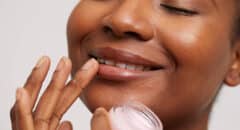
There’s a lot of information out there regarding blue light and how it affects your overall health. When it comes to your skin, however, there are still some things we don’t know. One thing that’s certain is that constant exposure to blue light can significantly affect the health and appearance of your skin.
Blue light exists in the visible light spectrum, which is how you’re able to see items that are blue. Being exposed to blue light isn’t always a bad thing. During the day, a little blue light stimulates your body to increase your focus, attention, reaction times, and good mood. However, getting blue light at night or for prolonged periods has been shown to disrupt sleep, affect healthy vision, and damage the skin.
The main source of blue light is the sun. As mentioned previously, a bit of sun can do wonders for your body but bad things happen when you get too much. Unfortunately, it’s not as easy to avoid the blue light that comes from electronic devices as well as fluorescent and LED lights. According to health experts, the amount of harmful light that comes from these sources might be less than the sun but you’ll spend more time exposed to these than the sun. The cumulative effect can have a significant impact.

Recent studies show that constant exposure to blue light can affect the skin in three main ways. First, it can promote the generation of reactive oxygen compounds that can cause damage to the skin. These compounds cause elastin fibers and collagen to break down. Elastin and collagen are important to keeping the skin flexible and moisturized.
Secondly, blue light typically promotes the production of free radicals, which have been shown to cause premature skin aging. Finally, too much exposure to blue light can lead to cell shrinkage and death. Shrinking cells can give the appearance of aging.
Skin that has been affected by blue light damage will show hyperpigmentation, swelling, redness, and weinkling. The effects have also been known to be more apparent in those with darker skin tones. That means African Americans will need to be even more careful in managing their exposure than those with lighter skin.

How Do You Protect Your Skin From Blue Light?
Since the sun is the primary source of blue light, it’s best to limit your exposure as much as possible. If you must be in the sun, make sure to wear protective clothing including a hat and sunglasses. Wearing the appropriate level of sunscreen will also be helpful. When you’re choosing sunscreen, look for products that contain zinc oxide or titanium dioxide which provide a physical block to blue light.
Exposure to electronic devices should also be limited. You should find ways to use your phone less and decrease the brightness setting to protect both your eyes and skin. If you spend most of your days in front of a computer screen, experts recommend using a screen protector that will filter out blue light.
While it’s not completely clear if skin damage from blue light can be reversed, studies suggest that using the right skin products may be a good start. Products that have effective antioxidants like Vitamin C have been shown to protect the skin from the harmful oxidative effects of free radicals as well as reduce the appearance of hyperpigmentation.
While more research is needed, there is enough evidence to suggest that being continually exposed to blue light from your electronic devices can cause premature aging in the skin. If you want to stop this from happening to you, it’s essential to manage how often you use them and take protective measures when you do.









